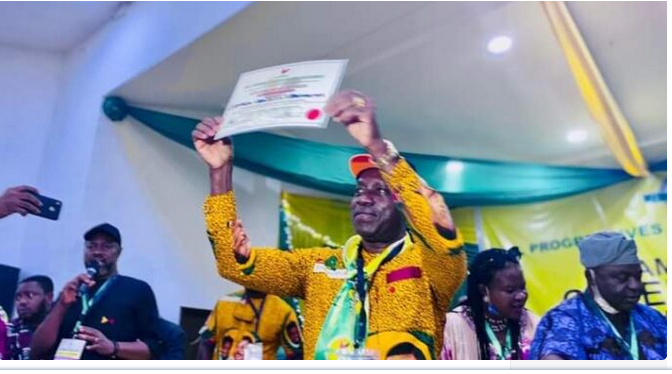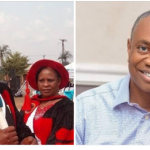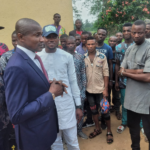If any of the governorship contestants in the Anambra 2021 was asked to be substituted at the time of the contest for the detained IPOB leader, chances were that all of them would have engaged in another struggle to be the one to be behind the bars. All the governorship contestants along with their respective parties were in frenzied fight to outwit another as to who owned Kanu more. It was not unusual. As far as the Igbo cause is concerned in Nigeria, it is not silly solidarity. At least, since 1966, if not beyond, the issue that Kanu stands for, which has meteorically elevated him from obscurity to prominence, has enjoyed consensual identification among the Igbos.
Though Olusegun Obasanjo in My Command often refers to it as “so-called,” the word, Biafra has gradually become a synecdoche for balkanisation of Nigeria. IPOB is resurfacing a rested movement earlier spearheaded by Emeka Ojukwu for Biafra’s breakaway from Nigeria. APGA founded by Ojukwu has invariably become a party synonymous with the Igbos and interchangeably Biafra. Since the governorship days of Peter Obi, after painstakingly and jurisprudentially dismantling all the fraudulent electoral and unconstitutional blocks mounted against the governorship mandate given to him during the 2003 general elections, Anambra, where Ojukwu hailed from, has become the stronghold of APGA.
Though the 2021 governorship election in Anambra was rightfully a democratic process for recruitment of a political leader to administer the affairs of the state from March 2022, it was practically a litmus test of Kanu’s heroism. The result confirms that in Nigeria there is heroism in secessionism. It reinforces that being patriotic for Nigeria is not a plus that it ought to be but minus that it ought not to be.
By many standards, Nnamdi Azikiwe and Ojukwu could be said to be the two greatest Igbo persons in history, but they do not hold the same reckoning among their Igbo kinsmen. The former, a frontline nationalist, was premier of the former Eastern region before becoming Nigeria’s first and only ceremonial president. The latter, a soldier, was the first military governor of the Eastern Region of Nigeria and Biafra war-lord.
Whereas structures such as the University of Nigeria, Nsukka established under the leadership of the Zik of Africa are undoubtedly edifice springing perennial human development, they remain signposts derisively considered by not a few persons as evidence of overdose of Nigerians in the bloodstream of the Zungeru-born nationalist, the indelible psychological and physiological scars sustained during the war by the people of the former Eastern region are still being nursed with reverential – and neither remorse nor resentment – to Ojukwu. In fact, millions of lives lost then in the East may be counted as minor loss to the major loss of Biafra’s sovereignty.
On account of Ojukwu’s explanations in Because I am Involved, his description of Obafemi Awolowo as “the best President Nigeria never had,” which has been widely held as the most acceptable and befitting epitaph for the first premier of Western Nigeria, was a discreet way of spitting Zik who engaged in a life-long political rivalry with Awo. While Zik had avowal Nigerian-ness in matters of national life and a chunk of his personal doings, Awo’s nationalistic pursuit was unpretentiously one with primary consciousness of his Yoruba origin.
While nationalism is considered a foul play in leadership recruitment processes in Nigeria’s sub-national governments, secessionism does the game. Whether it could be classified into the elective or non-elective course, chauvinism has become a course in Nigerian politics that political players could only ignore to their peril.
Though APC has a face of the national party, it is seen in the Southern part of Nigeria except for the southwest as a party with sectional, personal and nepotistic hearts. The widely held perception that the Muhammadu Buhari-led government is on a mission for Fulanisation and Islamisation of Nigeria has mounted a big wall for APC to climb on electioneering issues in the south-east and south-south part of Nigeria that had earlier borne the brunt of the near-genocidal 30-month civil war from 1967 to 1970.
Apart from negativity accruing from controversy trailing the primaries through which his candidature emerge and the battered image of his family name following the Ubas role in a failed attempt to topple a civilian government, as well as infamy identification with Okija shrine, Andy Uba stood a very slim chance of winning the election because he belongs to the APC, which currently presides over Nigeria’s central government in Abuja.
For those defecting from their original party to the ruling party with presumptuousness of cashing in on assumed federal might to maul the party on the ground and mull their way to power, the woeful performance of Uba in the Anambra governorship election also offers empirical evaluation that joining APC does not vindicate the presumptuous dream of being in the winning-way.
It is equally noteworthy that the PDP candidate, Valentine Ozigbo, was quite apt in his assertion at the governorship election debate on November 1 that Uba and Soludo “represent the dysfunctional PDP of the past which (the party is currently) trying to change.” When Soludo and Uba first enjoyed the limelight of being in public office under the PDP government, the party was fraught with impunity and Anambra was among those at the receiving end of it.
One of the gratifying points of the Anambra 2021 was the absence of grandstanding figures that has become a common feature, especially in governorship elections where an incumbent governor is rounding off his final term. Governor Willie Obiano might have been the chief campaigner for the APGA governorship candidate but he was not portraying godfatherism, just as Soludo was not marketed with credentials of a godson.
Republicanism, an ingrained attribute of the Igbos, which Anambrarians have been epitomising since the election of Obi in 2023, was glaring. Since democracy centres its core value on the people against a person, Anambra governorship elections in recent times have become a flagship for other states to look up to in deepening Nigeria’s democracy.
Through what proceeded from his mouth at the electioneering period, Soludo, who in the course of his active political engagement for over ten years now has popularized Chukwuma as his first name over Charles that he used while governing Nigeria’s central bank, demonstrated that he is a proud Nigerian at peace with plight and pushes of his Igbo origin. At the governorship election debate, he said, “I’m pan-African and pan-Nigerian. On the issue of the unity of Nigeria, I am totally for that. However, IPOB must be heard. Ideology is not what can be killed by gun.”
On why heroism is attained in Nigeria through secessionism, the reason might not be so much with those tilting towards secessionism but more with leaders of supposed national interest causing people to resort to separatism. Since I agree roundly with Chinua Achebe’s expression in the first sentence in The Trouble with Nigeria that Nigeria’s problem, of which separatism is one of them, “is simply and squarely a failure of leadership,” it is up to the leadership of Nigeria to enthrone nationalism and dethrone tribalism in all ramifications so that heroism can be earned through national patriotism and not secessionism.
Ekanem wrote from Lagos.




